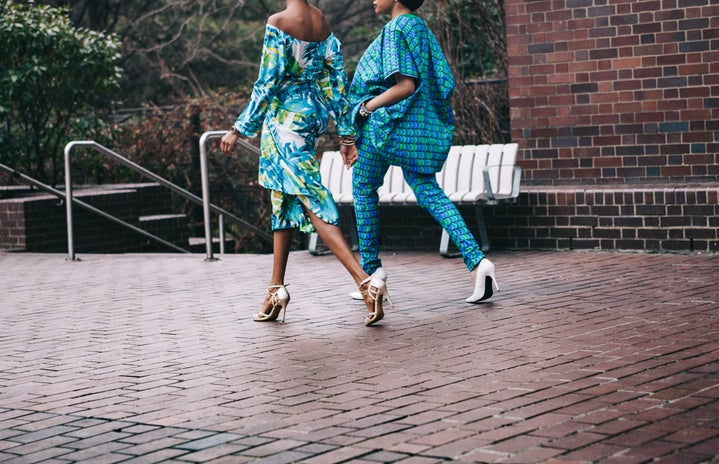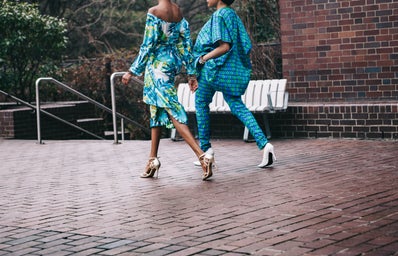Nike has made 2018 a year of prominent business moves. The company announced the release of The Force is Female campaign in 2017. This campaign is aimed at empowering women by making them believe in themselves. It is about celebrating the power of women in the world, and in a streetwear category of fashion in which they are often marginalized from. (Bread&Butter.com) This is not Nike’s first inclusive line; they released their Equality for All campaign last year around this month that encouraged “people to take the fairness and respect they see in sports and translate them off the field”. (Adweek.com) The Equality line released various clothing items and shoes by signed athletes like Lebron James and Kyrie Irving. Nike also has produced a Black History Month shoe for the last 15 years. They have recently produced a shoe in remembrance of Martin Luther King Jr., commemorating his “I Have A Dream” speech. (Nike.com) Nike has a clear drive for inclusivity and, considering their diverse demographic, it is fit to do so. As genuine as these campaigns may be, another opinion has been presented; stating Nike is doing nothing but capitalizing off of the success of athletes of color. More specifically, this opinion is concerning young people of color that are obsessing over the brand of Nike itself, rather than the positive impact the company is attempting to make. The hype over Nike brand shoes has led to violence in inner city communities of color because so many people want them and they are simply not accessible to everyone. The price tag and the exclusivity of the shoe leads to jealousy and therefore a chain reaction of robbery and murders. The documentary “Sneakerheadz,” (directed by David T. Friendly and Mick Partridge) estimated 1,200 deaths over sneakers each year. So the dispute revolves around Nike’s real concern for their demographic and if they are genuinely for the culture or for the profit.
Releases top to bottom
(The Force is Female, Black History Month 2018, Martin Luther King Jr.)
The Force Is Female collection was designed by women for women. A majority of the promotional aspects have been created by women as well. Everything from creative direction to photography and styling has been women ran to show Nike’s devotion to the Force Is Female line. The first Black History Month shoe was released in 2003. A majority of the first designs focused on the pan-African flag colors on Nike’s traditional Air Force 1. As the designs developed over time, various amounts of colors were included along with different shoe designs. A couple to keep in mind are the Nike Air Max and Jordan brand shoes. Each shoe line was inspired by different key components of black history. For example, the 2014 line celebrated women’s excellence in sports. The line was therefore geared toward women including wedged Nike sneakers. The Black History Month collection will overlap with the Equality collection this year as NBA teams will wear Black History Month warm-up tees featuring inspiring words. The warm-up tees are currently available to the general public as of February 1st. (Nike.com) Nike’s use of the NBA for promotional activities is a huge beneficiary factor to their profits. The all-star athletes in the NBA not only promote the brand but they promote the image of elite athleticism. The idea of elitism drives the desire for the brand because their demographic aspires to be equally as powerful as who they are looking up to. Outside of their athletic dominance, many NBA stars like Lebron James promote activism within their own community, making them universal role models. This impact on society by Nike goes beyond their sponsored athletes working in various communities because the company itself has created programs to aid inner city youth as well. Nike has founded programs like Mentor and Peace Players to provide at-risk youth with guidance and chances to connect with others through sports.
The Southern Digest thoroughly explained the capitalist point of view on Nike as a company. The article stated that “The price tag and the quantity of shoes Nike is willing to place on the market, especially those flaunting the Air Jordan logo is often responsible for violence in low-income black communities”. This sad truth is not an occasional occurrence either. Complex magazine released a timeline of sneaker violence that focused on specific incidents of robbery and extreme violence in inner-city communities. Some of these events were random in which young black men would get robbed for their shoes while other events were centered around packed release dates in front of major retailers like Foot Locker and Finish Line. These events prove the extremity of “sneakerhead culture” and regardless of the bad publicity these events bring, Nike continues to succeed. Now with these facts presented, it is interesting to wonder if Nike truly cares about their demographic. If the league was not filled with so many black athletes, which would result in a shift in demographic, would Nike still care about being a politically driven company? Would their interests remain in equality if it was not a pressing issue to their consumers? Considering that Nike is not a one-sided company these questions can be answered favoring each side. Nevertheless, it is important that consumers to dive deep into what companies do outside of producing their products, especially within the fashion world because it is so easy to be blind to the ignorance of a company that you can be supporting simply through what you wear.


